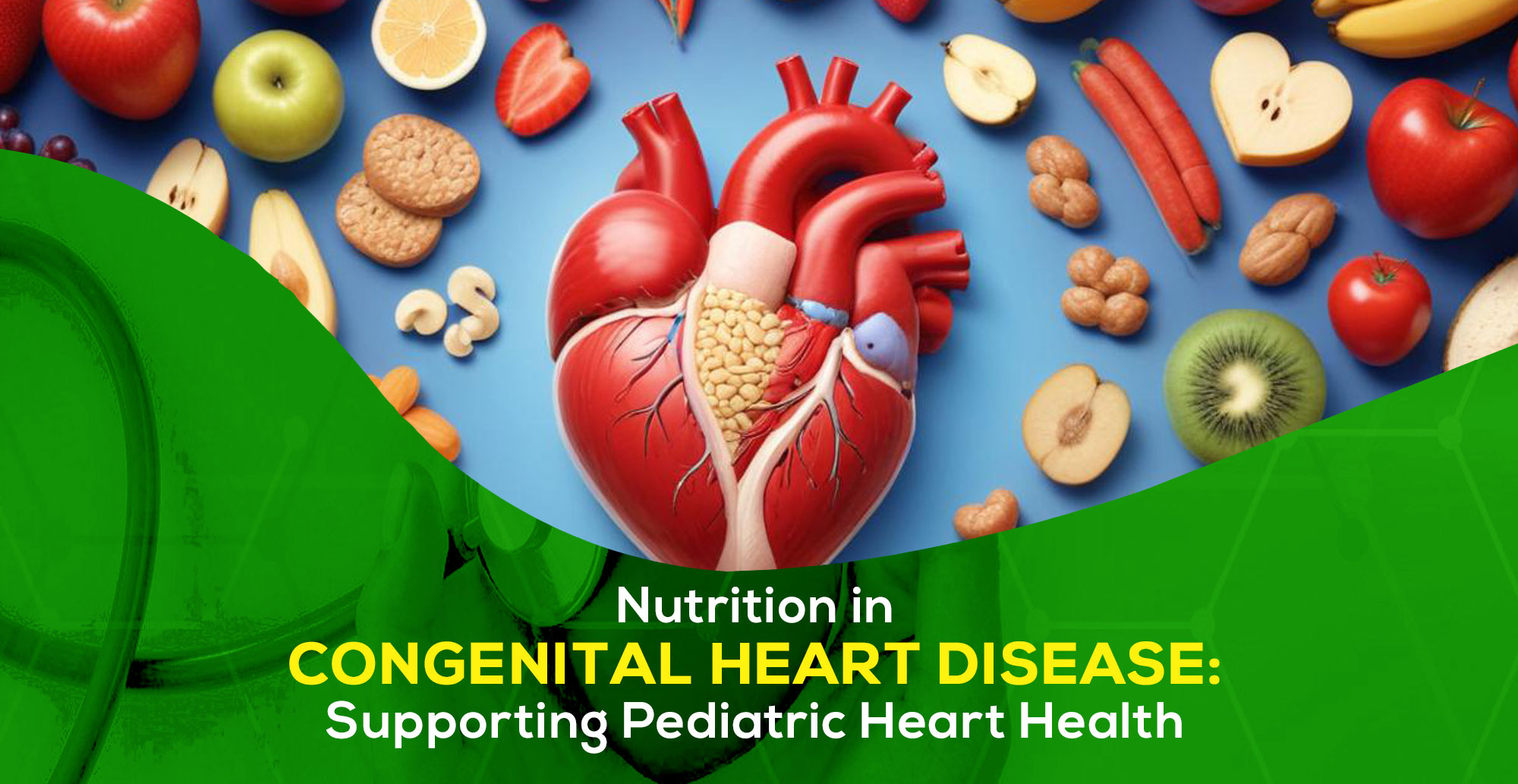Subtotal $0.00
Table of Contents
ToggleIntroduction
When it comes to supporting pediatric heart health, nutrition plays a pivotal role. For children diagnosed with congenital heart disease (CHD), maintaining optimal nutrition is crucial to their overall well-being and management of the condition. CHD is a common birth defect affecting the heart’s structure and function, requiring specialized care and attention. In this article, we’ll explore the importance of nutrition in managing CHD, highlight dietary recommendations, and provide insights into the expertise of child heart doctors and congenital heart disease doctors in Kolkata.
Understanding Congenital Heart Disease
Definition and Types of CHD
Congenital heart disease encompasses a range of structural heart defects present from birth. These defects can involve the heart walls, valves, arteries, and veins, leading to various health complications. Common types of CHD include atrial septal defects, ventricular septal defects, tetralogy of Fallot, transposition of the great arteries, etc.
The Causes of Congenital Heart Disease
Genetic Factors
Genetic factors play a significant role in the development of CHD. Hereditary transmission is a key factor, with many cases of CHD linked to specific genetic mutations. Chromosomal abnormalities, such as those seen in Down syndrome, also increase the risk of congenital heart defects.
Infections during Pregnancy
Infections during pregnancy are another crucial factor in the development of CHD. Rubella, or German measles, is a well-known cause of congenital heart defects if contracted during the first trimester. Other viral infections can also pose significant risks to fetal heart development.
Maternal Health Conditions
Certain maternal health conditions are associated with an increased risk of CHD. Type I and Type II diabetes can significantly impact fetal development, as can obesity and hypertension. Phenylketonuria is a rare but serious inherited disorder. This is another risk factor that can lead to congenital heart defects.
Medications and Substance Exposure
Exposure to certain medications and substances during pregnancy can cause congenital anomalies. Alcohol, recreational drugs, and some prescription medications are known to increase the risk of CHD. It is essential for pregnant women to consult healthcare providers before taking any medication.
Nutritional Deficiencies
Nutritional deficiencies, particularly poor nutrition and malnutrition, are linked to an increased risk of congenital heart defects. Folic acid is crucial for proper fetal development, and its deficiency can lead to several congenital anomalies, including CHD. Ensuring adequate intake of essential nutrients is vital for pregnant women.
Preventive Measures
Preventive measures are crucial in reducing the incidence of CHD. Preconception care, including genetic counseling and health assessments, can help prospective parents understand and mitigate their risks. Prenatal care and regular screening during pregnancy are vital for early detection and intervention.
Diagnosis and Early Detection
Early detection of CHD is essential for effective management and treatment. Prenatal diagnostics, such as pregnancy ultrasound and fetal echocardiography, can identify heart defects before birth. Neonatal screening and regular check-ups can detect CHD early in life, allowing for timely interventions.
Treatment and Management
Treatment and management of CHD depend on the severity and type of defect. Angiographic or surgical interventions are often required to correct structural abnormalities. Medication management can help control symptoms and prevent complications. Long-term care and follow-up are crucial for individuals with CHD to maintain their health and quality of life.
Research and Future Directions
Ongoing research and clinical trials continue to advance our understanding of CHD. Innovations in treatment, such as minimally invasive surgical techniques and personalized medicine, offer hope for improved outcomes. The future of CHD care looks promising, with ongoing efforts to enhance prevention, diagnosis, and treatment.
Living with Congenital Heart Disease
Living with CHD presents unique challenges, but many individuals lead fulfilling lives with proper care and support. Quality of life considerations include physical health, mental well-being, and social support.
Role of Nutrition in Congenital Heart Disease(CHD) Management
Nutritional Needs for Children with Congenital Heart Disease (CHD)
Children with CHD often have unique nutritional needs due to their condition. Adequate nutrition is essential for supporting growth, enhancing immune function, and improving overall energy levels. Proper nutrition also aids in the recovery process post-surgery or medical interventions and pediatric heart health.
Importance of Balanced Diet
A balanced diet, rich in essential nutrients, helps in maintaining pediatricheart health. Key nutrients such as proteins, vitamins, and minerals play a significant role in the body’s growth and repair processes. A well-balanced diet ensures that children receive the necessary nutrients to support their cardiovascular system.
Common Nutritional Deficiencies in CHD
Children with congenital heart defects are at risk of various nutritional deficiencies, including iron, calcium, and vitamin D. These deficiencies can lead to complications like anemia, poor tooth and bone health, and compromised immune function. Regular monitoring and supplementation, as recommended by healthcare providers, are crucial.
Dietary Recommendations for CHD
Essential nutrients for heart health
- Proteins: Proteins, including lean meats, beans, dairy, etc., are essential for growth and tissue repair.
- Omega-3 Fatty Acids: Food sources of omega-3 fatty acids include fish, and walnuts that support heart health and reduce inflammation.
- Antioxidants: Antioxidant-rich foods, including fruits, vegetables, and whole grains, need to protect against cellular damage.
Some healthy foods to include in your diet
- Fruits and Vegetables: Provide essential vitamins and minerals.
- Whole Grains: Offer sustained energy and fiber.
- Lean Proteins: Support muscle development and repair.
Foods to Avoid
- Processed Foods: High in unhealthy fats and sugars.
- Salty Snacks: Excessive sodium can strain the heart.
- Sugary Beverages: Contribute to weight gain and poor nutrition.
Special dietary needs for children with Congenital Heart Disease
Children with CHD may require higher caloric intake due to increased energy expenditure. Caloric needs should be tailored to the child’s specific condition and activity level, ensuring they receive adequate energy for growth and development. Proper hydration is vital for heart function. Especially in children with heart conditions, where fluid balance is crucial. Pediatric cardiologists can provide specific guidelines based on individual needs.
Treatment for Congenital Heart Disease
Managing CHD requires a collaborative approach involving pediatric cardiologists, nutritionists, surgeons, nurses, and other specialists. A multidisciplinary team ensures comprehensive care, addressing all aspects of the child’s health.
How to Choose the Right Child Heart Doctor
Pediatric cardiologists in Kolkata offer a range of services, including diagnostic evaluations, medical management, interventional procedures, and postoperative care. These child heart doctors in Kolkata are well-versed in the latest advancements in pediatric cardiology and provide top-notch care to their young patients. They work closely with families to ensure comprehensive and compassionate care.
Selecting the right neonatal heart doctor involves considering factors such as experience, specialization, hospital affiliation, and patient reviews.
Testimonials and Reviews
Numerous families in Kolkata have shared their positive experiences with congenital heart disease doctors. Patient testimonials highlight the dedication and skill of these healthcare professionals in transforming lives. So to select the best congenital heart disease doctor in Kolkata, you need to follow patients’s reviews.
Expertise in CHD Treatment
Kolkata’s child heart doctors possess extensive experience in diagnosing and treating various forms of CHD. Their expertise ensures accurate diagnosis, effective treatment plans, and improved outcomes for children with heart defects. Ensure the experience and specialization of doctors.
Top Hospitals and Clinics
Leading hospitals and clinics in Kolkata are equipped with state-of-the-art facilities and technology to provide exceptional care for children with CHD. These institutions offer comprehensive cardiac services, from diagnosis to treatment and rehabilitation.It’s important to consider the hospital facilities where the pediatric cardiologists practice.
You may like: Advanced Pediatric Cardiac Treatments in Kolkata, India in 2024
Technological Advancements in CHD Management
Innovative Treatments
Advancements in medical technology have revolutionized the treatment of CHD. Minimally invasive procedures, advanced imaging techniques, and heart care facilities are among the innovations improving outcomes for children.
Role of Technology in Nutrition Management
Technology also plays a role in nutrition management for CHD. Technology enhances the precision and effectiveness of nutrition management, empowering individuals to make informed choices for their health and well-being. Telehealth services connect individuals with nutritionists and dietitians, providing expert guidance and support remotely. Advanced software and online applications help families monitor and manage their child’s dietary needs effectively.
You may read: Pediatric Cardiology Tips for a Healthy Heart in 2024
Conclusion
Supporting pediatric heart health through proper nutrition is essential for children with congenital heart disease. By understanding the unique nutritional needs, working with healthcare providers, and staying informed about the latest advancements, families can ensure the best possible outcomes for their children. With expert care from pediatric cardiologists and congenital heart disease doctors in Kolkata, children with CHD can lead healthier, more fulfilling lives.

Dr. Debasree Gangopadhyay is a highly respected pediatric cardiologist based in Kolkata, India, specializing in the diagnosis and treatment of heart conditions in children. With a compassionate approach and a commitment to excellence, Dr. Gangopadhyay has made significant contributions to the field of pediatric cardiology. Her expertise includes managing congenital heart defects, arrhythmias, and other cardiovascular conditions in young patients. Dr. Gangopadhyay is dedicated to providing personalized care and staying updated with the latest advancements in pediatric cardiology. She is passionate about educating families on heart health and actively participates in research and community outreach programs.




Comments are closed